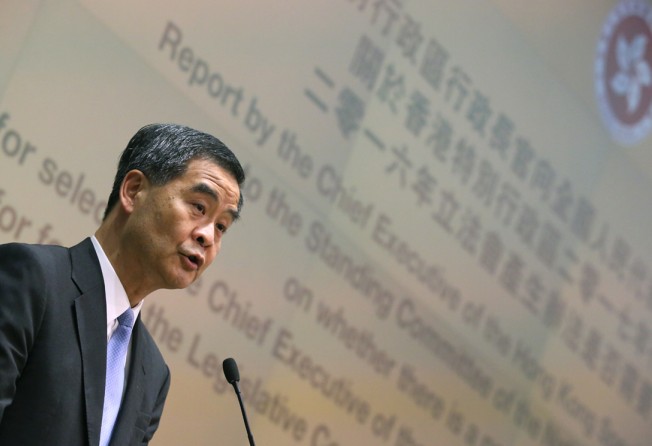Beijing may not be a political party pooper after all
New battle lines for 2016 Legco election may signal a rethink

So, we have a new political debate on the table: not the 2017 chief executive election, but the 2016 Legislative Council election.
Government sources have revealed that while Chief Executive Leung Chun-ying requested the 2016 election methods remain unchanged in his report to the Standing Committee of the National People's Congress - and got Beijing's agreement - the government is now considering certain significant changes through the local legislature.
This would apparently involve redrawing the borders of the five geographical constituencies to create nine constituencies. The number of Legco seats would remain at 70.
It's worth mentioning the timing of this information. Not only did the sources decide to speak out before the second round of public consultation on universal suffrage in 2017, which is expected to begin next month, but their comments also came just a few weeks after a pertinent remark by former chief executive Tung Chee-hwa - a point in danger of being overlooked.
In his first press conference in nine years, Tung declared that the "problematic" political system in Hong Kong had led to tension between the executive and the legislature, with government operations now "paralysed" by an uncooperative Legco. The argument implied that the executive-led political model desired by Beijing and the Hong Kong government was not working.
Tung's eyebrow-raising comment drew suggestions that he could be relaying a hint from Beijing that it may be worth testing how far party politics could go in Hong Kong.
Beijing has never been enthusiastic about party politics in the city. The Chinese constitution stipulates that there is only one ruling party in the country: the Communist Party. So how can another "ruling party" exist in Hong Kong even if it is under "one country, two systems"? Another issue is the length of time it would take - if possible at all - for pro-Beijing forces in Hong Kong to grow strong enough to become a major party, if not a ruling party.
Meanwhile there is deadlock on the 2017 universal suffrage debate. A government proposal based on the NPC's strict framework for the next election of the chief executive would likely be vetoed in Legco, since there are not enough pro-establishment lawmakers to secure the necessary two-thirds of the votes.
This may have prompted both Beijing and the Hong Kong government to rethink things and consider whether there was a way to secure more seats for Beijing-friendly parties in future.
Redrawing the constituencies is more than just a technicality. A higher number of smaller constituencies means parties need to devote more resources - and allocate them strategically - in each district in order to reach out more to the voters. It's not just about making eloquent speeches in the Legco chamber. It also means a party must come up with more candidates to run. Initial feedback regarding the possible change was that it would benefit the bigger parties, especially the Democratic Alliance for the Betterment and Progress of Hong Kong, the biggest pro-Beijing party. It holds nine seats in Legco.
The idea, in fact, was initiated by the DAB. Of course, the DAB would not be the only party to benefit; bigger parties with good records and district connections, regardless of political backgrounds, would find it helpful too - take for example the Democratic Party, a popular party with a better reputation for constituency work.
It is therefore interesting to note that those against increasing the number of constituencies include leaders of smaller parties in the pro-establishment camp, such as Regina Ip Lau Suk-yee, chairwoman of the New People's Party. She even pointed out that the idea could see the end of emerging small parties.
Whatever else it is, politics is also a competition of resources and talent. And our political parties must understand that the pursuit of party politics comes with the good and the bad.